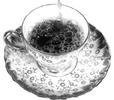
IT FLAVOURS the candy canes you hang on the Christmas tree, and puts the cool in your breath mints. But peppermint (Mentha piperita) is more than a yummy flavouring, it's also one of the most popular therapeutic herbs.
This herb, loaded with flavour, can relieve diarrhoea, reduce nasal congestion, soothe sore muscles and even treat irritable bowel syndrome. There are three chief species of mint in cultivation and general use Spearmint (Mentha viridis), Peppermint (M. piperita), and Pennyroyal (M. pulegium). The first one is ordinarily used for cooking. The species peppermint is a relative newcomer, first identified around 1700 A.D.
It could be easier to brew up some peppermint tea especially now that peppermint tea bags are available at supermarkets and health food stores. You can also use one to two teaspoons of dried peppermint leaves per cup of boiling water, steeping for 10 minutes.
TRY PEPPERMINT IF:
Your digestive system needs a jump-start. The mint-after-meals custom dates back to ancient Rome. The menthol in peppermint stimulates the production of bile, an essential digestive fluid that helps your body break down the nutrients in your food and it improves the function of the muscles that line the stomach and intestines which is why it can help relieve diarrhoea as well as irritable bowel syndrome. A hot cup of herbal tea is an excellent way to settle your stomach and improve digestion after a big meal.
To soothe your stomach or decongest your nose, use one to two teaspoons of dried peppermint per cup of boiling water. Steep for 10 minutes. Drink up to three cups a day. With a tincture, take one-quarter to one teaspoon up to three times a day.
To relieve pain peppermint is an ingredient in many modern pain-relieving skin creams. For wounds, burns, scalds and cold sores, apply a few drops of peppermint oil directly to the affected area. Discontinue if a rash develops.
To ease congestion menthol, the active ingredient that gives peppermint its kick, relieves nasal, sinus and chest congestion. Peppermint is, in fact, one of the few remedies for the common cold which has been approved by the U.S.Food Drug Administration (FDA). So next time you're sick, try a cup of peppermint tea.
Peppermint is so effective against coughing that its oil is an ingredient in many cough drops. Peppermint seems to work by increasing saliva production, making you swallow more frequently and suppressing the cough reflex. Drink three to four cups of cool peppermint tea throughout the day, taking a few sips every 15 to 30 minutes.
If you have bad breath, sip lots of peppermint tea throughout the day. For extra freshening power, add a pinch of anise, caraway, or cinnamon.
Mice are so averse to the smell of mint, either fresh or dried, that they will leave untouched any food where it is scattered.
Spearmint is chiefly used for culinary purposes. The properties of spearmint oil resemble those of peppermint, but its effects are less powerful, and it is less used than peppermint. From two to five drops may be given on sugar, or from one-half to one teaspoonful of spirit of spearmint with 2 tablespoons of water.
SAFETY CONSIDERATIONS
Peppermint in tea or candy is generally regarded as safe for adults. But you shouldn't give peppermint tea to infants or very young children.
Peppermint oil is a more serious matter. It's highly concentrated and should be used only in small amounts.
Pure menthol is poisonous and should never be taken internally.
Source:http://www.botanical.com/botanical/mgmh/m/mints-39.html; http://www.metromkt.net/viable/1pepperm.shtml
Dr. Sylvia Mitchell, research fellow (Graduate School), Biotechnology Centre, University of the West Indies, Mona, email: smitchel@uwimona.edu.jm

